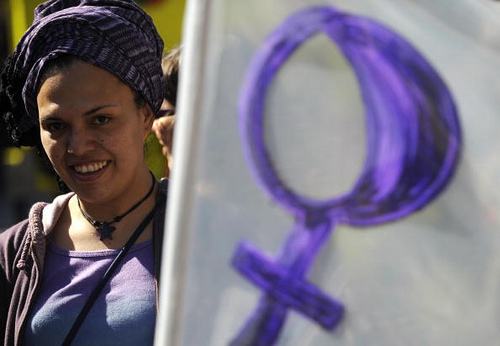8th March 2012 Dublin, Ireland
International Women’s Day – female guest bloggers

Today is a very important day. It is my birthday. More seriously, it is International Women’s Day. The role of woman in European society has evolved a lot in recent years, mostly in a positive direction. However, there is a great deal still to do. Women are still under represented at the top levels in both the public and private sectors and still face glass ceilings and discrimination in various forms. Today’s blog sets out the views and experiences of four women with a Polish connection. I am very grateful to them for their fascinating contributions! It is an enjoyable read but contains serious messages.
Anna Grodzka MP, Sejm of the Republic of Poland
“It was summer; I was walking along Krakowskie Przedmieście Street and thinking about the day that was drawing to a close. Suddenly, I noticed a few words written hastily with a felt-tip pen on the pavement. – “This is not a country for fine women” – the crooked letters cried, and I stood there in silence, wondering what thoughts tormented that male / female author if he or she decided to express those thoughts in that place where hardly anyone would stop and read the inscription before hurrying to their own affairs.
And I too hurried to my own affairs. I reflected upon those words later and it continue to reflect on them, especially now, at a time when radio, television and shop windows remind all of us that the Women’s Day is coming in. I would wish, I would wish so very much to hear that Poland is a country for fine women, I dream so very much that it can be one. The Women’s Day may be a pleasant day for many ladies, sweetened with chocolates or flowers, but in fact it’s a sugar coating for a very bitter pill.
And the truth is that it’s not easy to be a woman in Poland. Especially if we look at attempts to reconcile all roles in which women see themselves and which they accept under social pressure that is still strong. A mother-Pole, businesswoman, educated, attractive, smiling, with good earnings, pursuing her professional career, wife, cook, nurse, politician … The list is very long. In such an entanglement of expectations we find it difficult to find our own way. We have more and more freedom, but do we have equal chances? Many women have already achieved a lot, but there is still a lot to be done. And one should start with education and upbringing in the spirit of equality. There will be no change as long as textbooks for children will feature the same pictures – girls with dolls, mothers wearing aprons and cooking dinners, boys with plastic guns and serious fathers with briefcases leaving their homes for their serious workplaces.
Not only children need education – so do adults – and those who guffaw when they hear the term “Ms. Ministress”, and those who would be most happy to see women bending over boiling pots. Such education towards equality is being pursued both formally and informally, in the everyday work of many people in the government, offices, organisations, in their step-by-step actions aiming at changes at the social and political level. And on this way towards change we should appreciate the activeness of women who organised the Women’s Congress, who fought for quotas, who are active in the local government, in non-governmental organisations, and who every day, slowly, pave the road towards a better future for all of us so that new generations can cry out loud that Poland is a country of fine women and a fine country for women!”
A green island in a time of drought as seen from a female perspective – Olga Grygier-Siddons, Country Managing Partner, PricewaterhouseCoopers Poland
“Leading Poland’s largest financial services firm is a very challenging yet satisfying role. It is one which I could never do without the full support of my family. They play a big role in my success and I am very grateful for that. Women are playing an increasing role in top management in Poland and that is heartening to see. I would like to think that we are not there just to make the numbers up, but because we have a real contribution to make.
In mid 2010, when the Prime Minister of Poland presented a map showing Poland as a green island of economic growth against a sea of red, many believed the situation would not last long. They claimed the perverse forces of the world economy would be stronger than the optimism of Polish consumers or the vitality of Polish entrepreneurs. Looking at the most recent data, we are still optimistic. The GDP in 2011 grew by 4.3%, and the forecast for 2012 is also strong – according to Eurostat, Poland will be the growth leader in the EU (with a 2.5% increase in GDP).
Polish companies are growing and becoming more globalized. In 2010 they invested more than 4 billion EUR on world markets. Investments are not only directed towards Asia’s developing markets or the transition economies of the former Soviet Union. Companies are also actively building their position in western markets. More importantly, many of the firms investing abroad are medium-sized companies offering innovative and high-tech products. Large stadia are being opened (we are hosting UEFA Championship this June), while new motorways and other transport and communication facilities are under construction. Although Poland is gradually closing its development gap, a lot of hard work (and money) is still required to upgrade our infrastructure.
PwC recently calculated that the development gap between the largest Polish metropolis and average western EU cities is still wide. The average citizen in a large Polish city (who we shall call Mr Kowalski) lives in 24m2 of space whereas his counterpart in Stuttgart or Vienna (Mr Schmidt) has almost 40m2 of space in which to live. When Mr Shmidt leaves his large apartment, he has almost twice as many means of transport at his disposal. He can also count on better hospitals and schools and a greater number of cultural and entertainment facilities such as theatres and cinemas. This means that living standards and levels of comfort in Poland are still below EU standards. We still have to develop fast and invest, so that Mr Kowalski won’t feel there is much difference (except for the view from his window and the weather outside) between living in Kraków, Barcelona or Munich.
We hope (and the latest economic data can only strengthen our beliefs) that the current economic slowdown will not slow down our progress. We believe that even in times of difficult access to capital, tight fiscal policies and a possible decrease in EU funds, that we shall still be able to realize our ambitions, although it will require an even more responsible approach to finances, management of our investments and a more innovative approach to business. Greenery dies if it is not watered – this is critical especially in times of drought.
As you can see there is plenty to do and we need women engaged in today’s challenging business environment to put Poland’s and Europe’s economy back on track”.
Marta Kochanowska, President, Ius et Lex Foundation
“Days such as the International Women’s Day offer us an opportunity to reflect on and to evaluate where we are and how we got there. As an international corporate lawyer, corporate counsel for one of the world’s largest companies, president of the renowned Ius et Lex Foundation and the founder of the “10 April 2010 Foundation”, my life has been shaped by many people.
From the outset, my professional life was influenced by people who treated each and every person as an individual, regardless of whether they were male or female. I quickly realised the importance of this approach in today’s diverse working environment. However, the biggest influence on me was without doubt my father. He instilled a moral code in me from an early age, that has driven and motivated me ever since. He led by example, setting high standards and expectations for himself, and never expecting others to do something he wouldn’t do himself. He taught me how important it is to do the right thing in making a decision and I have tried to apply this every day in my professional career. I hope one day I will be able to mentor people in the same way I have been lucky enough to experience”.
Jessica Glover, Deputy Head of Mission, British Embassy Warsaw
“As a single woman in my twenties, I was full of confidence that, among my peers, the women shared the same opportunities as the men. Looking up towards senior figures – whether in Government, in the Foreign Office, in the private sector – it was clear that the overall picture needed to become more balanced. But looking around me, at the bright, capable, dynamic women and men working together, I thought that my generation would come through bringing change with it. And I greatly admire those women who were already in senior positions at the vanguard of that change.
As a married woman with a baby in my thirties, I have a very real personal sense of the choices a woman makes about work and life. And I am still confident that the trend of a greater mix of men and women in senior positions will continue. Looking around me now, I see that it is not just the women who will drive this change, but the men too. The challenges I face as a woman and a diplomat – how to make sure I spend time with my daughter, how to make sure my husband can pursue a fulfilling career – are no longer choices that are unique to women. My male colleagues also want to spend time with their children. They also have partners with their own career aspirations. The challenges are there and they are real, but they are shared.
I see this in the FCO, in the UK amongst my friends, and I see it in Poland too. More and more women are in senior and influential positions in both the public and private sector. I hosted a lunch yesterday for two of my FCO colleagues. The three guests happened to be women. I have had the pleasure to meet and interact with Ministers and CEOs who are women – not thinking about being women, but thinking about doing a successful job in hand.
We’re not there yet. The central staircase in the Embassy here in Warsaw is lined with pictures of previous Ambassadors. They are all men. But I do feel part of an organisation that is getting there, even in dangerous places: I have enormous admiration for Fiona Gibb and for Jane Marriott, who were preparing to go to Yemen and Iran as I was preparing to come to Warsaw. I feel part of an organisation which supports women, including women who have children. And I am working in an age where developments in IT mean that we can do our jobs, whether men or women, without being bound to a particular place at a particular time. There are challenges, of course, but there are also great possibilities”.